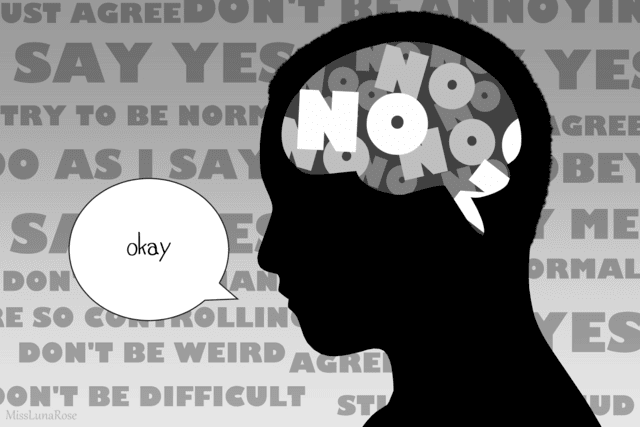Assertiveness: A behavioral trait and communication style characterized by the ability to express thoughts, feelings, needs and beliefs directly in a clear and appropriate manner.
“Be calm; yet assertive.
―Charles F Glassman
Meek; yet courageous.
Be gentle; yet bold.
Kind; yet strong.”
Assertive people advocate for themselves by communicating effectively, authentically, justly, and tactfully to express wants, needs, opinions, and boundaries to others. It is the ability to:
- Stand up for your personal rights; establish and maintain personal boundaries.
- Remain emotionally balanced and collected in the face of challenging situations; composure.
- Be clear about your feelings, choices and agenda.
- Ask for what you want while actively listening to what others want.
- Respect the personal rights and boundaries of others.
- Take responsibility for feelings, behavior and subjective experience.
- Solve problems in a constructive, win-win manner.
Assertiveness is Responsible Communication
Assertiveness is therefore not only the power to communicate your wants and feelings clearly, but a healthy ownership of that power. It is not an attempt to control, manipulate or bully others nor is it a refusal to express, act or choose because of fear of what might happen. It is a healthy and functional expression of the mature ego that takes into consideration both your own and others’ rights and wishes.
Assertive people are not timid in expressing opinions or defending their point of view. They use influence and persuasion in pursuit of goals but do not verbally attack, make demands, or otherwise cross the line into manipulation. They are open to both constructive criticism and compliments. Assertive people respond to emotions without resorting to aggression or collapsing into passivity.
Assertiveness is an important social and communication skill and is necessary to develop mature boundaries, confidence, and self-esteem. Additionally, assertive people experience less anxiety and less stress.
“There is nothing intelligent about not standing up for yourself. You may not win every battle. However, everyone will at least know what you stood for—YOU.”
―Shannon L. Alder
Several behaviors are involved:
- To express wants and make requests.
- Insist that your rights are respected and that you are treated as an equal human being.
- To express negative feelings such as criticism, disagreement, resentments, and the desire to be left alone before anger and resentment build.
- Expressing positive emotions such as pride, joy, complements, and attraction.
- Initiating, engaging in, and ending conversations comfortably and with composure.
- Sharing your feelings, opinions, wishes, wants and experiences with others.
- To question and ask why.
- To constructively and tactfully confront authority or tradition to assume greater responsibility and share of control with the intent of making things better.
Concepts in Understanding and Applying Assertiveness
Be Clear
Say yes when you mean yes, no when you mean no, and maybe when you are unable to commit due to other (legitimate) considerations.

If you do not want to do something, say ‘No’. While this sounds obvious, many people have difficulty saying ‘No’ and agree to requests and demands that are not in their self-interest. The assertive use of ‘No’ establishes your boundaries, helps avoid conflict, and reduces stress. When you find you are having difficulty saying ‘No’ it is often because of fear of a negative response.
Saying no when someone is displaying aggression could result in more aggression; saying no may result in the disapproval of others if they find your refusal disappointing. And, of course, saying no to someone in authority could lead to problems within the organization.
Fear of Others’ Response Undermines Assertiveness
However, acting out of fear of how others may or may not respond is not only allowing your emotions to control you ― it is giving your personal power away. Allowing others to manipulate your emotional state in order to influence your responses and behavior represents a hole in the personal boundary. Boundaries and assertiveness are closely related – learn more in the boundaries post.
Just as you have the right to say ‘Yes’, ‘No’, or ‘Maybe’, others have the right to ask something of you – but you always have the right to say ‘No’ to the request. When you exercise that right in an assertive but appropriate way, others, in general, become more respectful of you and your time.
I encourage people to remember that “no” is a complete sentence. ― Gavin de Becker
Assertiveness Requires Conscientious Use of Maybe
While assertiveness means being clear, it does not necessarily mean being certain; saying ‘Maybe’ is appropriate when information is scarce, the situation is opaque, or when events must unfold before determining whether to commit. However, be aware of your intentions when using maybe – avoid the use of maybe when you really mean no. This is usually done in an attempt to shield the other person from rejection. Also avoid the use of maybe when you mean “Yes, if nothing better comes along.” The routine use of ‘Maybe’ to keep your options open is childish and low integrity.
Ask For What You Want
Ask everything you want from everyone in your life whenever appropriate. The secret is to ask for what you want and let go of it if the answer is ‘No’. There is a difference between being persistent in your assertiveness and being pridefully stubborn. As a rule of thumb, passive people do not ask. Aggressive people demand and manipulate. Assertive people ask without inhibition.
Don’t be afraid to assert yourself, because silence won’t protect you. ― Audre Lorde
It is important to remain focused in the expression of wants and listening to the wants of others and not allow yourself to become argumentative. Assertiveness is not a tactic to force your way upon others, right ancient school-ground injustices, or make others lose so you feel like you win. It is a non-competitive strategy whereby you authentically represent your values and integrity. Being true to yourself is primary; the outcome is secondary.
Listen After You Speak
Assertiveness is a commitment to be open in expressing wants, thoughts or feelings and the encouragement to others to do so as well. It is also listening to the views of others and responding constructively, regardless of your agreement or lack of agreement with those views. Assertive individuals listen attentively and give others the space to express themselves.
Pay attention to validating other’s feelings and opinions when you are assertive. Show genuine interest to demonstrate that you see the value of their experience and the legitimacy of what they feel. This validation of others is self-empowering and leads to much more effective communication than self-defense in which feelings are invalidated or from misguided guilt from having “caused” them.
Assertiveness Guarantees Clarity
While assertiveness may or may not result in a favorable outcome, it almost always results in increased clarity and awareness. You will know where you stand with regard to others and as a result, will be satisfied after an interaction with someone when you have presented yourself and your position authentically.
This satisfaction will not depend on whether the other person agrees with you or even acknowledges your point of view. It depends solely on telling your truth, and with practice, you will not feel the need to go back and say more. There will be no need to correct other’s impressions of you because you spoke the truth in your possession at the time and that is enough, even if you could have communicated more effectively.
In order to create the maximum amount of clarity in a given situation, strive to:
Stay Composed
Composure is a state of calmness, emotional control, and mental balance. It is cool-headedness in the face of stressful and challenging situations and refers to managing emotions, thoughts and actions in a controlled and stable manner. Composure enables one to think clearly and exercise good judgment when faced with adversity or emotionally charged situations.
Composure does not involve suppressing our own emotions. It is channeling those emotions constructively to spark intuition, thoughtful decisions, and rational action. Composure manifests as an inner sense of tranquility before inspiration, decision, and going all-in on a solution in difficult circumstances.
Non-reactive is stable, graceful, and composed
Calmness, like its opposite, panic, is contagious. Therefore, composure is a vital characteristic of assertive leadership and encourages effective communication and fosters problem-solving. It allows others to express themselves calmly and promotes patience in listening to proposed solutions.
Being calm and non-reactive to others’ emotions is key. We must remain composed, not only in situational challenges but also when someone is displaying aggression toward us. Often, the aggression is not overt but passive and covertly narcissistic – which is to say controlling. In these cases, avoiding defensiveness is paramount. Remember that children defend; adults acknowledge. Often the best response is, “That’s an interesting point of view.” We will have more on this topic in the narcissism posts.
Composure is derived from other desirable qualities: Resilience, self-discipline, and emotional stability. All of these qualities are professionally valuable and beneficial in other aspects of life including personal relationships. Individuals who display composure come across as reliable, trustworthy, and socially graceful.
Developing composure involves cultivating increased self-awareness and emotional intelligence. It requires recognizing and understanding one’s own emotions and attuning to the emotions of others. Techniques such as disengaging, breathing, re-engaging and other stress management strategies can help enhance composure in challenging situations. And, as always, journaling about difficult situations and their related emotions can provide insight into handling similar situations better in the future.
Interpret Others’ Behavior Appropriately
You can use other’s behavior as information to inform your response rather than be emotionally affected by it. You can observe, interpret, and understand the behavior of others without reacting or allowing it to control you. Nor do you need to elicit a particular response from them.
You may ask others to listen, understand, and acknowledge your wants, feelings, and choices but you do not need their validation. Your position stands on its own merit and by expressing yourself while separating yourself from the outcome, you validate yourself.
Take Responsibility
People’s feelings are a result of how they choose to interpret a situation. No one can force another to feel any particular way. If you feel angry or upset the other person did not choose for you to feel this way. The reverse is also true: If someone you are speaking with becomes angry or upset, you are not the direct cause. This concept is central to emotional maturity, boundaries, and is a thread that touches many other psychological and maturity concepts. You can read about boundaries here.
Below is a psychological event chain, based on the work of Albert Ellis, the father of cognitive-behavioral therapy, that illuminates the process of how feelings result from the interpretation of an event:
- Activating event (open to interpretation).
- Belief about the event (based on past experience and/or choice).
- Emotional and behavioral response (feeling and response based on the belief that was triggered by the action).
So, in simplified terms, what happened, followed by our interpretation of what happened, followed by what we feel and do. What is important to realize is that the activating event does not cause the feeling; in fact, one element in the chain does not even directly cause the next. The activating event triggers the belief, and the belief triggers the feeling.
Take Responsibility For Your Feelings and Refuse To Take Responsibility For Others’ Feelings
This is why we are responsible for our feelings and others are responsible for theirs. Others may trigger us with their behavior, but we own our interpretation of it. The resulting feeling was only induced by their actions, not directly caused by it. They are responsible only for their action. The feeling and subsequent response are our responsibility alone.
Key to understanding this process is the observation that feelings are never permanent. Beliefs, on the other hand, can be. The beliefs that are retained are not the original, fleeting feeling, such as anger, but the narrative that keeps the “drama” alive. Our beliefs (or drama) surrounding feelings can serve to mask feelings such as sadness and fear. Understanding and accepting this fully is vital not only to effective communication but to emotional maturity and personal growth.
Blaming others for your feelings is a defensive strategy that serves to avoid recognizing and experiencing difficult and challenging feelings. Entertaining this belief is unfair to the other party and responding based on it will likely come across as an attack, shutting down effective communication.
As David Richo wrote in How To Be An Adult:
“No one creates your feelings. No one is to blame for your situation. You are the author of your condition. Whatever you have been doing is what you are really choosing, whether or not you consciously want it. The alternative it to see yourself as a victim of people or circumstances and real change becomes impossible. Taking responsibility always leads to a revelation of what your next step needs to be.”
Others Won’t Always Respond Well To Assertiveness
When being assertive, others may blame you for their feelings. Others may interpret you as aggressive. Keep in mind their interpretations of your behavior are not necessarily fully based in objective reality. If others blame you for their feelings, adjust your demeanor down a notch or two and reassure them you are simply asking for what you want, not demanding it. You do not hurt other people’s feeling with assertiveness, providing you are not bullying them. It may mean they are not experienced or capable of interacting successfully with an assertive person or your assertiveness has triggered negative emotions from their past.
Do not hesitate to check out your feelings and doubts with others, either those involved or people you trust for advice. Try to check out your decisions with a neutral party before proceeding to action – an uninvolved person might have insight that is only visible to an objective observer.
True assertiveness, when executed properly, is neither defensive nor offensive.
Obstacles to Assertiveness

Most of us are products of imperfect families. Apart from the obvious dysfunctional family issues sometimes present such as addiction, violence, and abuse, most of us we raised in homes characterized by parental lying, denial of reality, confusing or conflicting signals and beliefs, and a general lack of respect for our minds and bodies. Most of us emerge from childhood wounded with unfinished emotional business.
Early in childhood, many children are taught that it is not legitimate to:
- Express true feelings, particularly negative ones.
- Express opinions.
- Say ‘No’ to what you do not want.
- Ask for what you want directly.
- Give and receive freely.
- Attend to your own interests.
- Act as if you are worthy and deserving of love, respect and abundance.
These are obstructions to the possession of personal power. If you relate to some or all of the items on this list, then your assertive capabilities have been restricted. The extent to which you have internalized them corresponds directly to how severely your adult wings have been clipped.
Get so far out of your comfort zone you can’t find your way back. ―Paulette Dale, Ph.D
Act As If Your Wants and Needs Are Important (Because They Are)
When putting assertiveness into practice, it is often necessary to “act as if” you are confident in your assertiveness. Act as if you are the healthiest, most confident person you’re capable of being. However, pretending to be confident when you are not is like pretending to be a millionaire when you’re broke – you may feel a variety of uncomfortable feelings initially. You may feel yourself to be selfish, impolite, demanding, cold or prideful. The source of these judgments is based on beliefs, often transmitted from others and often from early childhood, that have been internalized. They may be from early experiences you are not consciously aware of.
Becoming more assertive is a learned skill that can be developed through self-awareness, being honest with yourself and others about your needs and preferences, and taking action to pursue your goals. Practice, perseverance, and self-reflection are key in developing this important skill. Therapy and assertiveness training and exercises can also be beneficial.
The following are some practical strategies to start moving in a positive direction:
- Setting assertiveness goals at work, home and personal relationships.
- Identifying situations, personalities, and specific people that are challenging and where changes are needed.
- Determining appropriate ways of asserting yourself in specific situations that you have identified as growth opportunities.
- Facing collapses into aggression or passivity and the feelings triggering these collapses honestly, journaling and evaluating the legitimacy of those feelings (or lack thereof), and constructing strategies to identify and mitigate any compromising effects of those feelings in the moment. This is a tall order and will take practice and perseverance.
- Practice responding assertively, either through role-playing, contrived situations, or in real life.
- Increasing awareness through deconstructing challenging encounters using journaling and/or discussing with a therapist, sponsor, or coach.
Keep In Mind
Assertiveness falls under the general umbrella of pursuing self-interest while respecting others. Therefore, in certain situations the physical safety of yourself and those around you take precedence. Use common sense to determine when speaking up for yourself is appropriate. When the other person or persons are out-of-control, under the influence of alcohol or drugs, and/or threatening violence, simply removing yourself from the situation may be the most prudent and assertive response.
Finally, remember to find the balance between empathy for others and authentically expressing needs and feelings – assertiveness is seeking that middle ground between passivity and aggression.
